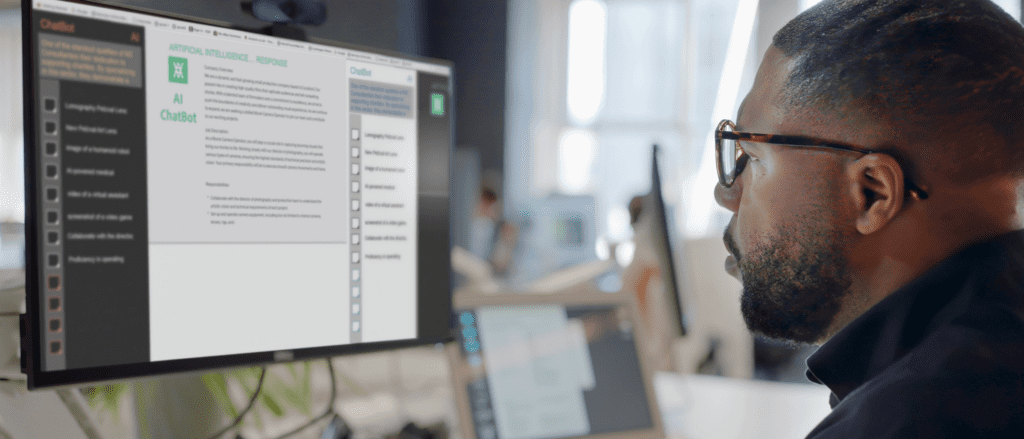AI-Powered Competency Profiles: A New Era for Learning and Development
Creating comprehensive competency profiles is a daunting and resource-intensive task — one that many learning and development (L&D) professionals know all too well. It often involves months of analysis, stakeholder input, and iterative revisions, leaving talent teams stuck in a seemingly endless loop. Just when you think you’ve nailed down the perfect mix of skills, knowledge, and abilities for a particular role, another revision comes down the pipeline, sending you back to the drawing board.
Fortunately, there’s a more effective solution: artificial intelligence (AI). By harnessing AI, organizations can now streamline the process of developing competency profiles, dramatically reducing the time and effort involved.
Let’s take a look at how AI can help you build a scalable, adaptable competency profile infrastructure that will transform your talent management and L&D functions for good.
Why Competency Profiles Matter
Competency profiles, which outline the knowledge, skills, and abilities required for a particular job, are the basis of effective talent management. These profiles inform all aspects of the employee lifecycle, from recruitment and onboarding to training and performance evaluation. When done well, they enable your organization to hire the right people, develop their skills, and ensure their success in their roles.
The Challenge of Creating Competency Profiles
The challenge, however, is that building comprehensive competency profiles across an entire organization is a complex undertaking. It requires input from various stakeholders, multiple rounds of review and revision, and a deep understanding of each role’s nuances. As a result, many companies shy away from this critical initiative. Performance reviews, training programs, and succession planning all suffer when you lack this crucial foundation.
Here’s how an AI-driven approach to competency profiles works:
- Identifying common competencies: AI can analyze a wealth of data — including job descriptions, employee performance records, training materials, and industry benchmarks – to identify core competencies that are common across various roles. This allows you to quickly pinpoint the fundamental skills needed for positions like project managers, sales representatives, or software engineers.
- Constructing baseline profiles: Using insights gleaned from the data analysis, AI can then construct comprehensive baseline competency profiles. These profiles serve as a solid starting point, providing a detailed overview of the key skills, qualifications, and attributes needed to excel in each role.
- Streamlining the validation process: Equipped with AI-generated baseline profiles, you can shift from creating competency models from scratch to instead validating and refining them. Your subject matter experts and key stakeholders can now concentrate on ensuring the profiles accurately reflect the nuances of each individual role, rather than starting the arduous process over again for every position. This dramatically reduces the time and resources required to build out your full competency framework.
- Benchmarking and comparative analysis: AI can benchmark your competency profiles against industry standards and competitors. This allows you to see how your profiles stack up in comparison to similar roles in other organizations, helping to identify gaps and areas for improvement. Comparative analysis ensures that your competency profiles are not only accurate but also competitive.
With the AI-powered foundations in place, you can free up your talent team to dedicate their efforts to more specialized roles that require a hands-on approach. Leveraging AI for common job functions allows you to build a scalable competency profile system in a fraction of the time.
Addressing Specialized Roles
Of course, AI is not a one-size-fits-all solution. Highly specialized roles with unique company-specific skills and knowledge may require a more traditional process or a hybrid of traditional and AI-supported. However, these specialized roles are the exception rather than the rule and should not hinder your efforts to implement an AI-powered, skill-based talent management infrastructure.
Embracing AI for Talent Management
If your organization has been hesitant to adopt a competency-based talent management system, now is the time to reconsider. AI can help you quickly and efficiently create the foundation for a transformative talent management infrastructure, setting the stage for improved hiring, development, and performance.
Getting started is often the hardest part. If you are eager to learn more or get the ball rolling at your company, don’t hesitate to contact us.
About Mark Burke
Mark Burke is the Senior Director of Learning Strategy for Judge Learning Solutions where he consults with clients to help them assess their situation, create a strategy, and design and develop a best-in-class custom learning solution. Mark’s experience includes the creation and management of five different online universities, the development of competency profiles and related onboarding programs for many Fortune 100 companies, owning his own assessment and consulting company, and 20 years of developing and implementing learning strategies in both corporate and higher education environments.




